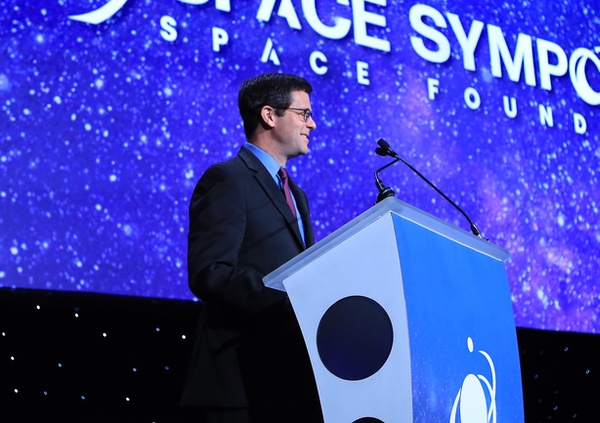Congress must reject the Defense Department’s hope-based strategy in spaceby Christopher Stone
|
| Unfortunately, the Space Force continues to be fettered by the policy and strategic frameworks instituted decades ago. |
On the positive side, senior DoD and White House space policy officials have done well to use speeches and open-source intelligence documents to provide the American people with insight into the Chinese space and counterspace weapons build-up.[3] They articulate the types of weapons systems being developed for China’s multi-layered attack architecture, but they either lack an understanding of how China sees space warfighting and deterrence or purposefully exchange the reality of China’s view with one of their own preferred futures, disjointed with reality as the adversary sees it.
First, in a recent speech, DoD’s space policy leader stated that while competition in space with China is a reality, “conflict with China is not inevitable. Conflict in space is not inevitable.”[4] This is understandable as a desirable policy, but it does not reflect operational reality nor does it reflect the views of Chinese military leadership. Since at least 2009, official People’s Liberation Army (PLA) media and leaders, such as the former Vice Chairman of the Central Military Commission, have stated that not only is space warfighting “inevitable” but it’s a “historical inevitability, and a development that cannot be turned back.”[5] In other words, China is developing warfighting capabilities because it believes that war in space is something that will happen, they are shaping their space force to wage it successfully against the United States and its allies.[6]
Second, senior DoD space policy leaders have been publicly advancing the notion of peaceful coexistence among all actors, “just as countries have done for decades in the air, and for centuries on land and at sea.”[7] History shows that peaceful coexistence in any domain is not the norm, but the exception. Therefore, space leaders should learn the lesson that China already knows and many in Congress still understand: peace can only come through strength, or as one PLA general put it, “only power can protect peace.”[8] As a result, our nation requires a credible space warfighting force to act as a deterrent to attacks and protect our space lines of communication. Sadly, the DoD’s present concept of deterrence is not one grounded in decades of deterrence theory and practice.
| “Absorbing the blow” is not a deterrent because we are not preventing the punch in the first place. |
Senior DoD policy leaders, including the Pentagon’s top space policy leader, say that deterrence comes from investment in “normalizing space as an operational domain” and “resilient architectures” that are able to “absorb the blows.”[9] The DoD thus “hopes to deter an adversary from attacking in the first place, because the value of such an attack will be greatly diminished.”[10] This is not deterrence and is not credible in the face of Chinese strategic views and its growing space warfighting capability to achieve it. First, resilience does not deter China as they have already been attacking US assets daily, according to Gen. David Thompson, Vice Chief of Space Operations.[11] Resiliency may allow us to continue to provide benefits from space, but it does not prevent all types of attacks on our critical space infrastructure.
Second, “absorbing the blow” is not a deterrent because we are not preventing the punch in the first place.[12] China’s view of deterrence in space consists of an active approach, meaning they “attack to deter” if a threat poses a danger to its interests or capabilities.[13] In addition, our proliferated constellations, popular among upcoming space projects, are being viewed by China not as confounding their ability to target or deny the benefits of proliferation, but rather—quite the opposite—it is seen by strategists and scientists as an opportunity for “killing” and “disabling” the entire network through one fell swoop, achieving “system destruction.”[14] Understanding the enemy is vital to ensuring that we have the “combat credible force” that Gen. B. Chance Saltzman, Chief of Space Operations is seeking.[15]
The DoD’s continued strategy of “hope”-based deterrence in space requires Congress to intervene in this year’s National Defense Authorization Act and correct the course of the nation’s defense space strategy from one of taking hits into one of credible deterrence via war-winning space weapons systems and a full grasp of the Chinese strategic thinking in this vital domain.
Endnotes
- Trump signs defense bill establishing U.S. Space Force: What comes next - SpaceNews
- Assistant Secretary of Defense Dr. John F. Plumb Remarks at the Space Foundation's 38th Space Symposium, Colorado Springs, Colorado - U.S. Department of Defense Speech
- 2023 Annual Threat Assessment of the U.S. Intelligence Community (dni.gov)
- Assistant Secretary of Defense Dr. John F. Plumb Remarks at the Space Foundation's 38th Space Symposium, Colorado Springs, Colorado - U.S. Department of Defense Speech
- China Dream Space Dream_Report.pdf (menlosecurity.com)
- China Declares Space War Inevitable | Military.com
- Assistant Secretary of Defense Dr. John F. Plumb Remarks at the Space Foundation's 38th Space Symposium, Colorado Springs, Colorado - U.S. Department of Defense Speech
- China Declares Space War Inevitable | Military.com
- Assistant Secretary of Defense Dr. John F. Plumb Remarks at the Space Foundation's 38th Space Symposium, Colorado Springs, Colorado - U.S. Department of Defense Speech
- Assistant Secretary of Defense Dr. John F. Plumb Remarks at the Space Foundation's 38th Space Symposium, Colorado Springs, Colorado - U.S. Department of Defense Speech
- U.S. Satellites Are Being Attacked Every Day According To Space Force General (thedrive.com)
- RAND_PE295.pdf (menlosecurity.com)
- Deterrence in Space: Requirements for Credibility | RealClearDefense
- China plans to develop weapon that can DESTROY Elon Musk's Starlink to protect 'national security' | Daily Mail Online
- Saltzman: ‘We’re in a Race to Build Combat Credibility Before We’re Put to the Test’ | Air & Space Forces Magazine (airandspaceforces.com)
Note: we are using a new commenting system, which may require you to create a new account.
